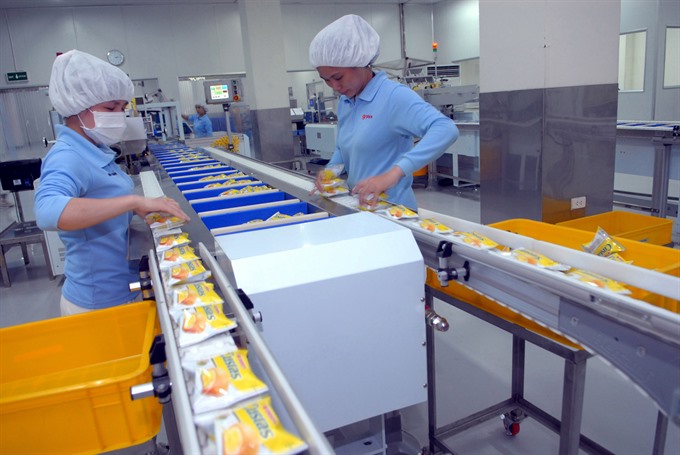Viet Nam aspires to become a country with prosperous development, inferior to no other countries in the world, Prime Minister Nguyen Xuan Phuc said at the Viet Nam Business Summit in Ha Noi.

Viet Nam aspires to become a country with prosperous development, inferior to no other countries in the world, Prime Minister Nguyen Xuan Phuc said at the Viet Nam Business Summit in Ha Noi on Thursday.
The summit, themed ‘Viet Nam – We Mean Business: Connect and Innovate,’ was part of the World Economic Forum on ASEAN 2018. It attracted more than 1,200 entrepreneurs and investors from around the world, along with representatives of foreign business associations, embassies and international organisations in Viet Nam.
Co-chairing the event with WEF President Borge Brende, PM Phuc said during 30 years of Doi moi (renewal), Viet Nam has implemented a policy of opening up for investment and integration.
“The liberalisation has brought great benefits for Viet Nam,” he said, adding that the country is always consistent in promoting free trade and globalisation.
Viet Nam has long treasured the substantial benefits of free trade, particularly amid the formidable challenges posed by global trade protectionism which is currently threatening bilateral and multilateral trade deals, he said.
However, he said that the economy still falls short of its expectations, with Vietnamese firms still not deeply integrated in global value chains.
Only 21 per cent of Viet Nam’s small- and medium-sized enterprises (SMEs) have taken part in global value chains, much lower than the 46 per cent in other ASEAN nations.
Although many foreign studies have pointed out Viet Nam’s success in global supply chains, generally speaking, Vietnamese businesses have only joined these chains in fields such as assembly or product packaging, which are links with low value and lack sustainability.
Input materials made by domestic manufacturers currently account for less than 27 per cent of the total input value of FDI firms, while the remainder is purchased from other FDI companies or imported, he noted.
Thus, Viet Nam should better its position in the global value chain by enhancing connections with foreign direct investment firms, he said, asking Vietnamese enterprises to improve their capacity.
Facing that fact, Viet Nam aims to move higher in global value chains and strengthen the connectivity between Vietnamese and FDI businesses, PM Phuc said, adding that it is becoming one of the workshops of the world and a pivotal spot for trans-national firms to supply products and services around the globe.
“The development of many local private enterprises shows that the business environment in Viet Nam is completely able to nurture big companies capable of competing against and co-operating with international ones,” he said.
He noted that by actively integrating with the rest of the world, the country is now a member of the World Trade Organisation and 12 free trade agreements, including the Comprehensive and Progressive Agreement for Trans-Pacific Partnership (CPTPP), the EU-Viet Nam Free Trade Agreement, and the Regional Comprehensive Economic Partnership (RCEP).
From here, investors have a chance to access almost all major markets, especially those in ASEAN. Viet Nam plays a significant role as a gateway and has one of the best geopolitical positions in global supply chains that not every country has access to, he emphasised.
The country has trade relations with over 200 countries and territories. It has also taken the lead in exporting many agricultural products like rice, pepper, coffee, cashew nut, basa fish, and shrimp. PM Phuc expressed his belief that Viet Nam’s agriculture potential would be fully tapped and could be a big magnet for investment and co-operation.
He also said Viet Nam needs to exert more efforts, foster more innovations, and make stronger reforms to improve its economic development level and narrow the gap with regional countries.
“The successes of businesses in the nation are also part of the Government’s successes,” he affirmed.
Viet Nam is not complacent
On Viet Nam’s economic achievements, WEF President Borge Brender said that in eight years since the last WEF held in Viet Nam in 2010, the local economy has witnessed fantastic growth, with gross domestic product (GDP) doubling and export revenue tripling.
Viet Nam is on track to achieve economic growth of nearly 7 per cent this year, while also experiencing the rapid development of foreign investment. The poverty rate declined significantly to 3 per cent from 50 per cent in the 1990s, he said.
The Vietnamese Government has “not slept in victory and is not complacent,” but is continuing to reform in order to ensure future growth, he said.
Dramatic improvements have been seen in Government debt, the banking sector, trade and the business environment, he stated, pointing at the economy’s weaknesses which need to be addressed, such as education quality and labour efficiency. Mobilising all economic resources to get involved in the Fourth Industrial Revolution is also a challenge, he added.
Vu Tien Loc, chairman of the Viet Nam Chamber of Commerce and Industry, said in the past two years, Viet Nam has been one of the countries with the highest number of discussions relating to Industry 4.0 and expects to see breakthroughs in the revolution.
According to a report released by the Global Startup Network this year, Viet Nam’s start-up index ranked sixth out of 54 surveyed economies. AlphaBeta’s research results also rank Viet Nam second in the technology investment environment and third in the digital talents in the Asia-Pacific region.
“These are the new advantages of Viet Nam in the digital economy, in addition to the traditional advantages of favourable geo-location, geo-economics, young and abundant workforce, and low cost. The efforts of institutional reform, the policy of putting people and businesses at the centre, are also becoming a new engine of the Vietnamese economy,” he added.
Loc said the context of trade conflict in the global economy is complicated, Viet Nam is expected to be a friendly and safe destination.
“I hope international businesses will come to Viet Nam to build global value chains”. — VNS





